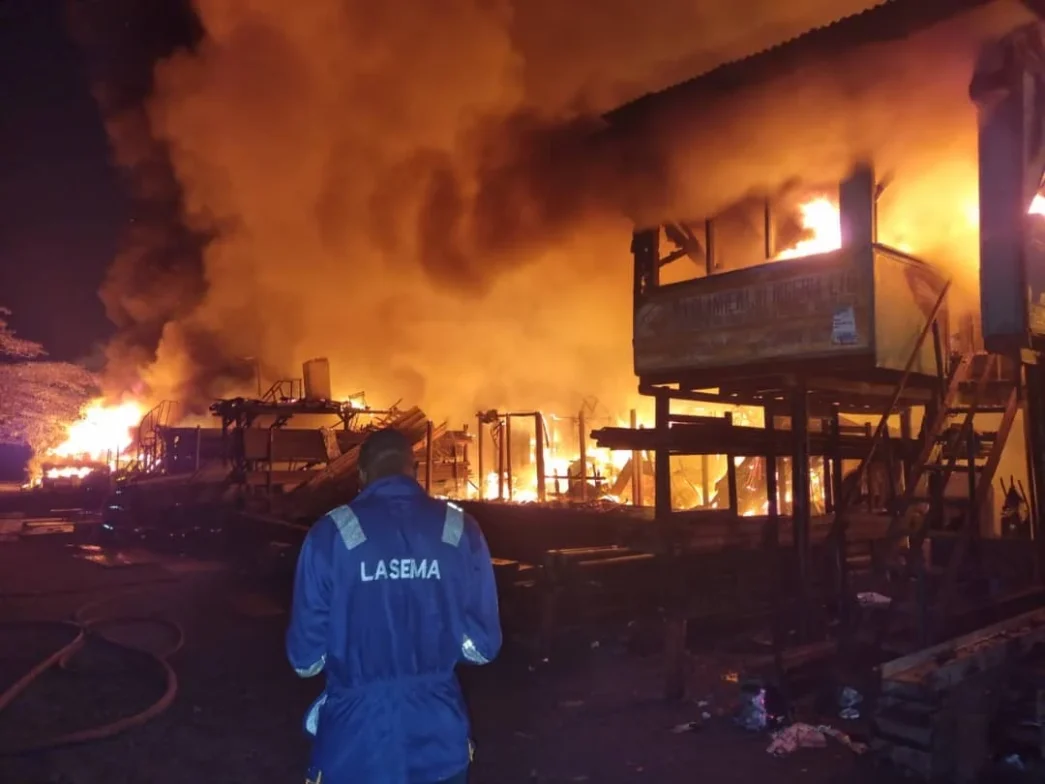A LASEMA official stands close to a burning fire at Ladipo market in Lagos
Smoke still lingered over the charred remains of shops and stalls in Jos, the Plateau state capital, when another market fire broke out at the phone village in Ilorin, Kwara state.
Recently, market fires have become a recurring incident across several states in Nigeria. In the first five months of 2025, the country has recorded at least 25 major market fire incidents across several states.
From the bustling lanes of Ladipo in Lagos to the plastic-laden aisles of Aleshinloye market in Ibadan, Oyo state, goods and structures have gone up in flames, leaving traders devastated and questions unanswered.
Below is a list of market fire incidents in 2025.
Advertisement
AKINOLA MARKET, OSUN
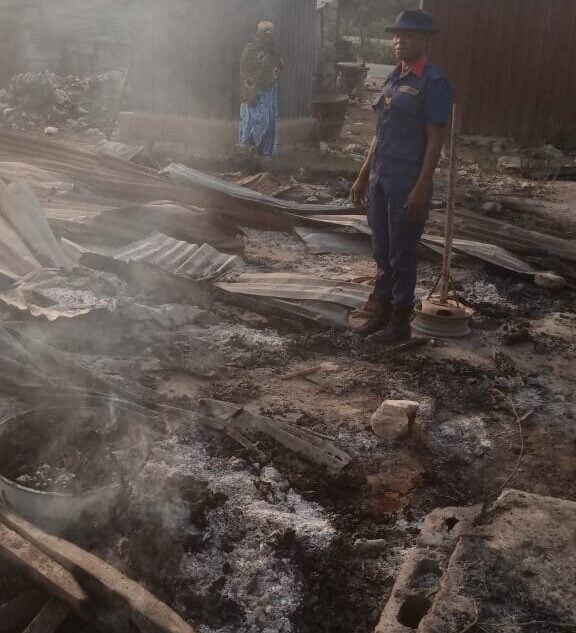
The foodstuff section of Akinola market, a weekly market in Ipetumodu, Osun state, was razed on January 10.
The fire was said to have been caused by unextinguished refuse after the traders had left the marketplace.
Advertisement
TALATA MARAFA CENTRAL MARKET, ZAMFARA
On February 18, a fire broke out at the Talata Mafara Central Market in Zamfara state.
According to the National Emergency Management Agency (NEMA), the incident resulted in the death of three people. Fifty persons also sustained varying degrees of injuries.
The state police command said a Dane gun was recovered from the scene of the explosion, which was said to have been preceded by a loud bang.
Advertisement
GUSAU CENTRAL MARKET, ZAMFARA
Over 100 shops were reportedly destroyed in a fire outbreak at the central market in Gusau, Zamfara capital city, on February 23.
The fire, said to have started at 10 pm, destroyed the perishable items section of the market.
The herbal medicine section of the market was also gutted in April. More than 50 shops were razed in the outbreak.
Advertisement
OGOJA LGA CENTRAL MARKET, CROSS RIVER
The Ogoja LGA Central Market in Ishibori, Cross River state, suffered a fire incident on January 7.
Advertisement
The incident happened two days after the Ogoja High Court was razed by fire.
LADIPO MARKET, LAGOS
Advertisement
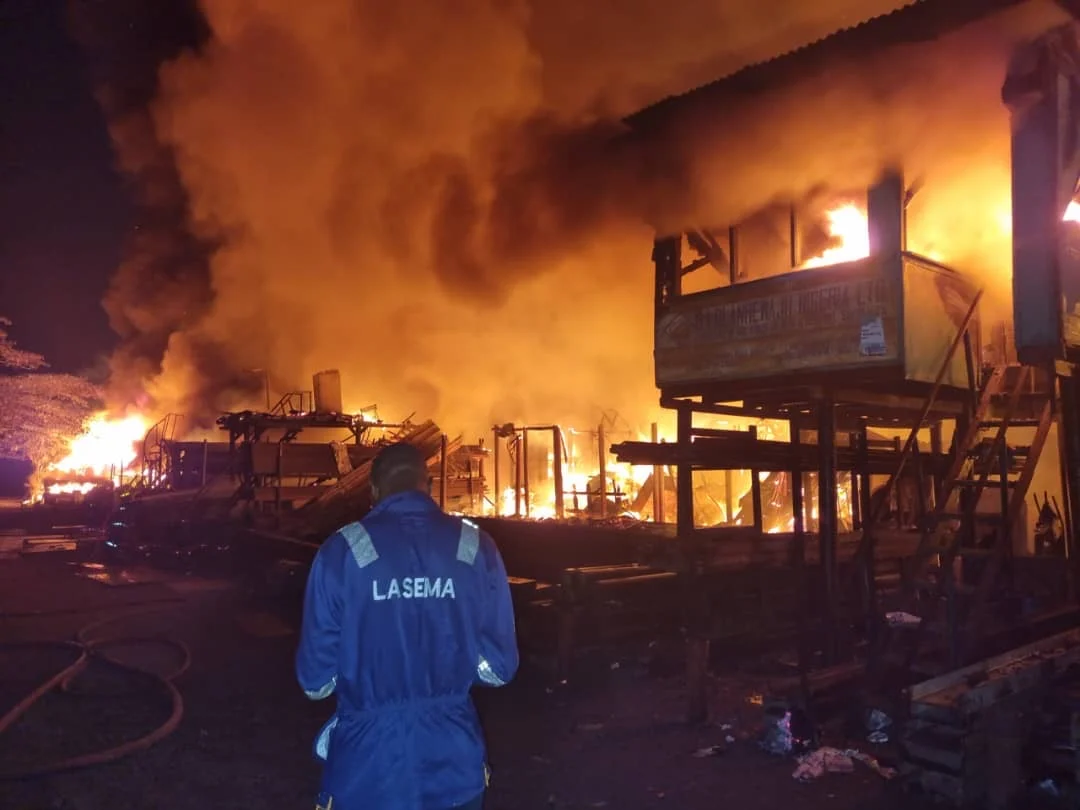
A warehouse surrounded by shops was gutted in the Ladipo market in Lagos in February.
Olufemi Oke-Osanyintolu, permanent secretary of the Lagos State Emergency Management Agency (LASEMA), said investigations revealed that the immediate cause of the fire was attributed to a power surge after public electricity supply was restored to the area.
Advertisement
The inferno affected the electronics, generator, bicycle, auto spare parts, furniture, phones, home appliances, and powerbike sections of the warehouse.
LASEMA said “comprehensive damage assessment shows that valuable goods worth a fortune were destroyed”.
OWODE ONIRIN MARKET, LAGOS
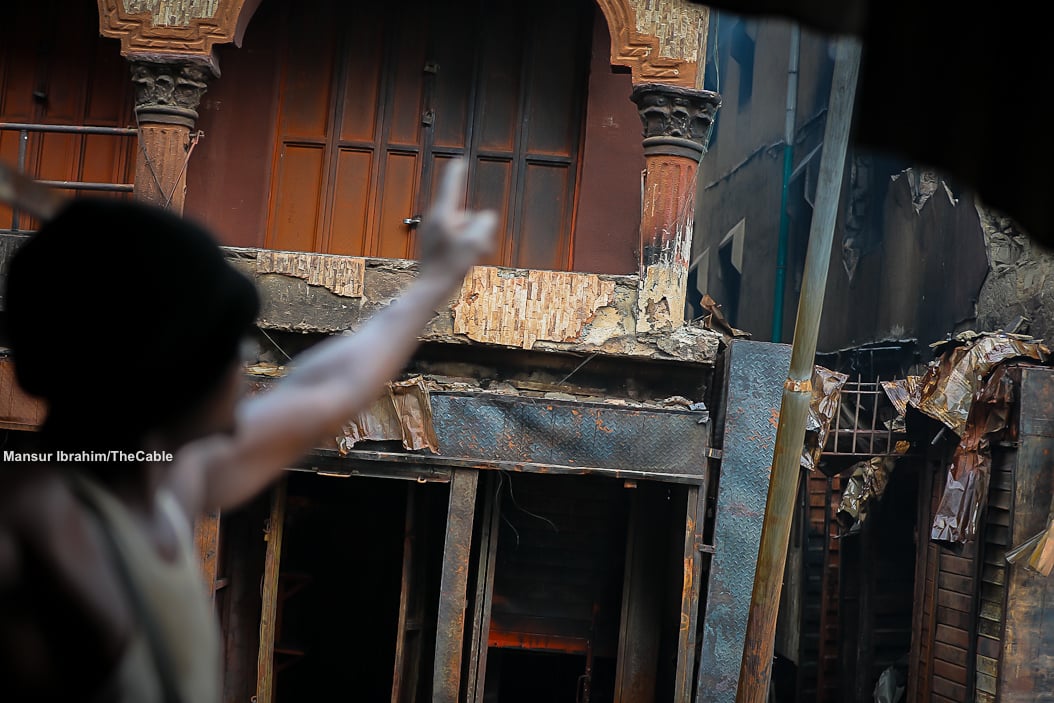
On the same night as the Ladipo fire outbreak, another fire incident affected multiple shops selling iron rods and other metallic materials at the Owode Onirin market along Ikorodu road.
In April 2024, the Lagos state government ordered the indefinite closure of the Dosumu market in the Idumota area of Lagos Island, over incessant fire outbreaks.
GOMBE OLD MARKET, GOMBE
On March 4, fire engulfed 18 shops at the Gombe Old market in Gombe state, causing significant losses to traders and business owners.
The fire was said to have been caused by an electrical surge.
SIMRA MULTI-PURPOSE MARKET, KANO
At about 4 am on March 19, the Simra Multi-purpose market in Kano state went up in flames, leading to the destruction of plastic and nylon-making industrial machines.
The market is home to small-scale rubber recycling industries in the Dakata area of the state. The fire razed several factories involved in the production of plastics and nylon.
KURMI JAKARA MARKET, KANO
At about 1 am on April 18, the Kano fire service received a distress call from the Jakara police division about a fire outbreak at the Kurmi Jakara market.
Saminu Abdullahi, spokesperson of the service, said six shops had already been razed when the officers got there. The officers put out the fire to prevent further spread.
BENUE RICE MILL MARKET
Traders suffered losses, including processed and unprocessed rice, milling and destoning machines, in the fire incident at Benue rice mill market, Makurdi, on March 17.
IHIOKWU MAIN MARKET, BENUE
Several shops were razed at the Ihiokwu main market in Obarike-Ito, Obi LGA of Benue state, on February 2.
The cause of the inferno was unknown. The fire was said to have burned for a long period owing to the absence of a fire station in the area, resulting in monumental loss of properties.
ALESHINLOYE MARKET, OYO
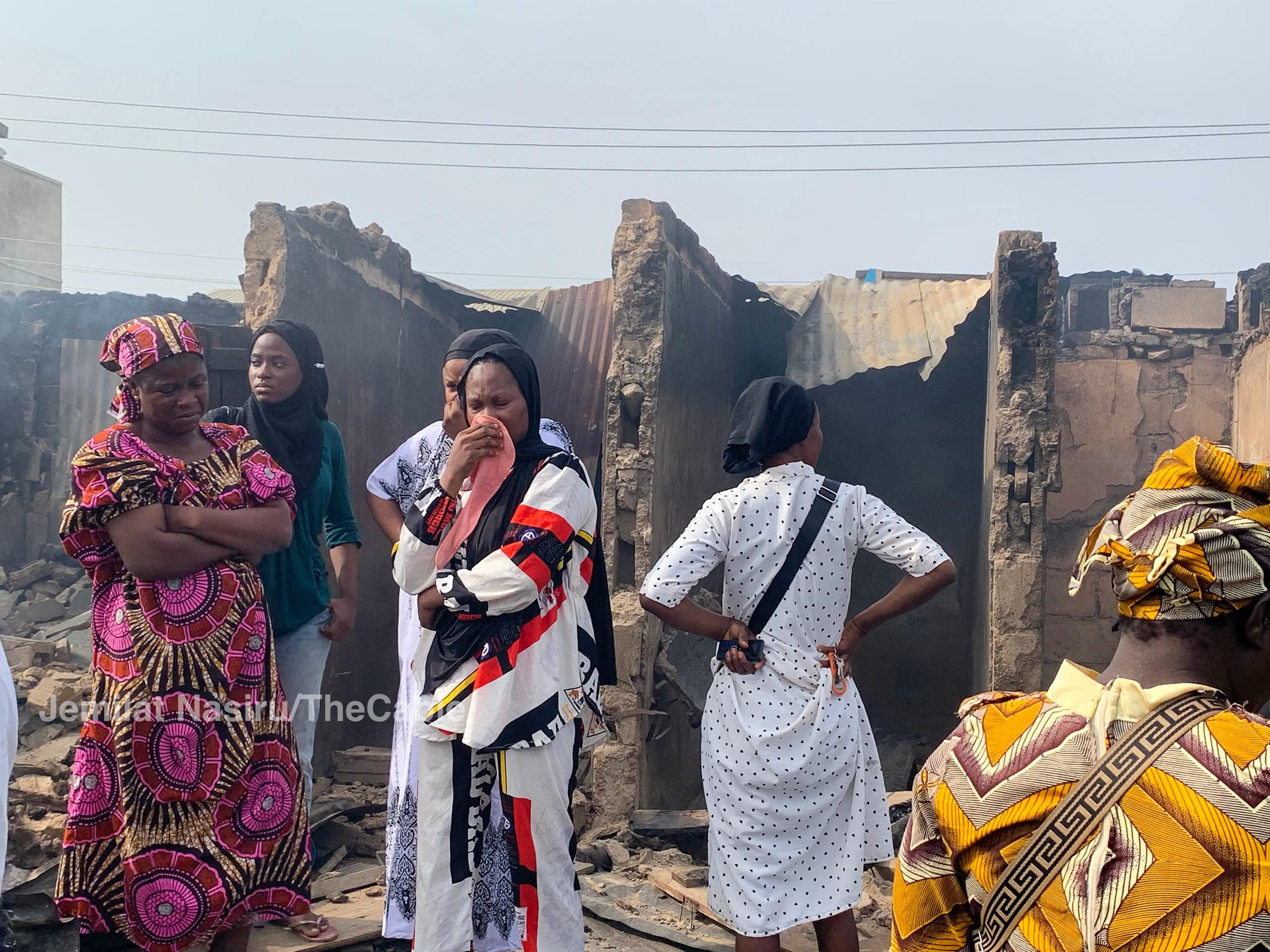
The plastic section of the Aleshinloye market in Ibadan, Oyo state capital, went up in flames on March 11.
While no casualties were recorded, over 50 stalls and shops were torched and goods worth millions of naira were lost to the inferno.
The fire burned for over 12 hours despite the presence of a fire station within the market premises. The facility was moribund, without a functional truck and water facilities.
MAYEGUN CEMENT STORE MARKET, OYO
At about 10 pm on April 10, at least 12 shops were razed following a fire outbreak at the Mayegun Cement Store market, Araromi, located a few kilometres from the Agodi Secretariat.
Yemi Akinyinka, general manager of the state fire service, said the service was able to contain the fire and prevent it from spreading further after it received a distress call.
The incident was the second recorded in the market, a few months apart.
In December 2024, the spare parts section of the Araromi market also went up in flames, destroying properties worth millions of naira.
GBAGI MARKET, OYO
Gbagi market, popular for the sale of fabrics, recorded a fire incident on April 20.
The fire was said to have started around 1 pm.
Akinyemi Akinyinka, general manager of the Oyo state fire service, said the service responded in less than 10 minutes and brought the fire under control.
SANGO STORES, OYO
At about 4:41 am on Friday, the Oyo state fire services agency received an emergency call reporting shops on fire behind Fart Oil Filling Station in Sango, Ibadan.
A contingent of firefighters was immediately deployed to the scene, where they met three out of ten prefabricated shops engulfed in flames.
No casualties were recorded.
The service said the fire was caused by an unattended deep freezer, which had been plugged in overnight.
IWEKA ELECTRONICS MARKET, ANAMBRA
On March 25, a fire incident occurred at Iweka Road, close to Ochanja market, Onitsha, Anambra state.
Chukwudi Chiketa, the state fire service chief, said the incident started about 8 pm and engulfed four shops containing furniture materials.
Chiketa said that the service personnel were deployed after receiving a distress call and were able to contain the fire.
ONITSHA MAIN MARKET, ANAMBRA
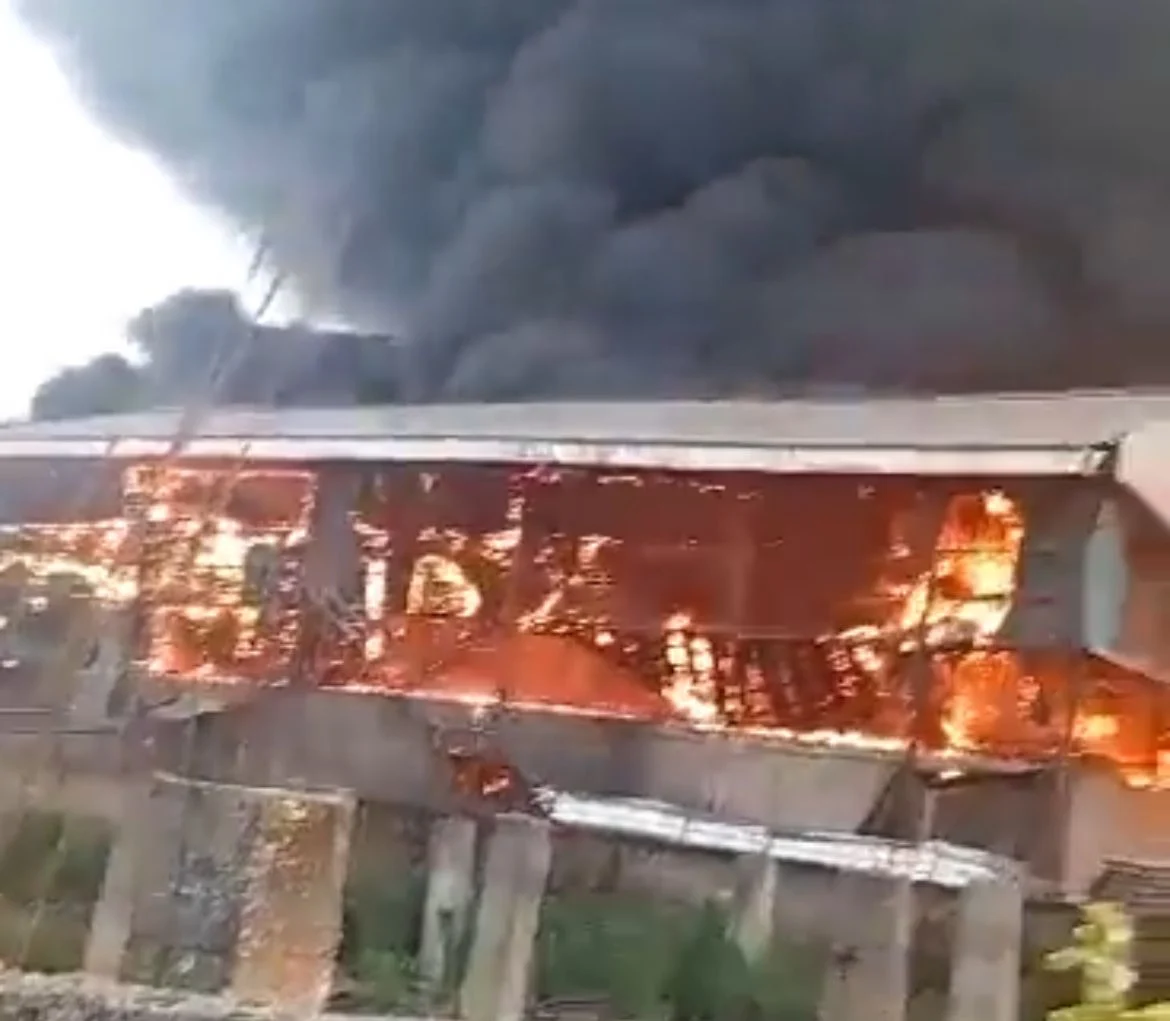
Just three days after the Iweka road incident, some story buildings serving as warehouses were gutted in a fire incident in parts of Onitsha main market on Ifejika street, near Sokoto road, in Anambra state on March 28.
The fire, which was said to have started around 6 am, broke out in one of the market buildings and spread to nearby structures.
NNEWI MARKET, ANAMBRA
The Anambra state fire service said it received a distress call at 2:15 am on January 14 of a fire outbreak at Ahia Mgbede, located opposite the Motor Spare Parts Market, Uruagu Nnewi, in Nnewi-north LGA.
Chiketa said the firefighters put off the inferno, but it reignited in the morning when it was finally distinguished.
KARA MARKET, SOKOTO
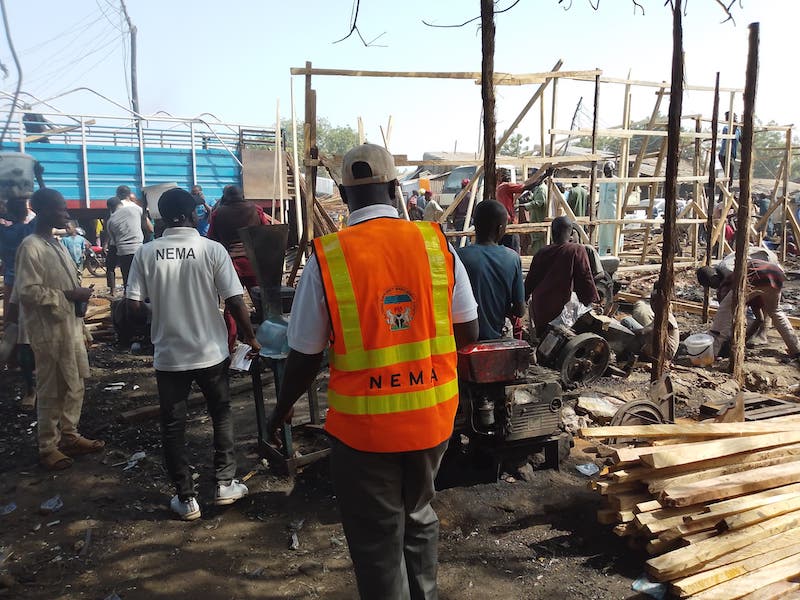
Sokoto Kara Market, a major hub for the sale of grains, has suffered two major fire outbreaks in 2025.
The first incident occurred on January 4, destroying over 50 grinding shops and also extending to nearby houses.
The second fire outbreak of March 1 resulted in the loss of several stores and edibles.
SOKOTO TIMBER MARKET
At least 560 shops were destroyed in a major fire outbreak at the timber market in Sokoto state on January 21.
According to NEMA, the fire burned for two days before it was eventually put out.
GWAGWA MARKET, FCT
About ten provision and cosmetics shops were torched in the early hours of April 13 following a fire outbreak at the main market in Gwagwa town, Abuja Municipal Area Council (AMAC) of the federal capital territory.
It took the combined efforts of the FCT fire service and volunteers to put out the fire after three hours.
JOS TERMINUS MARKET, PLATEAU STATE
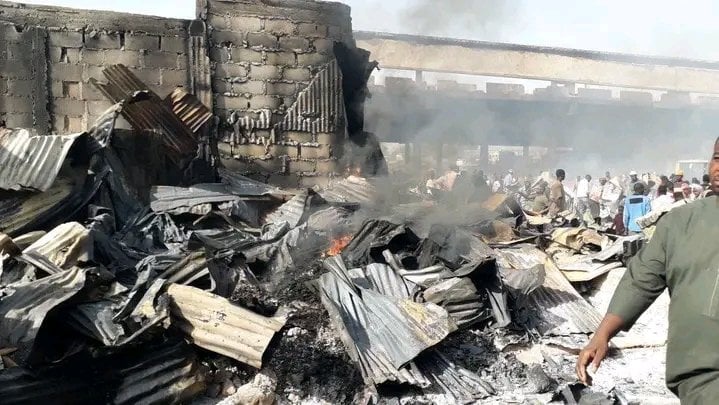
Over 500 makeshift stores were destroyed after a fire outbreak at the Terminus market midnight inferno in Jos-north LGA of Plateau state.
In July 2018, the Terminus market also recorded a fire incident where 270 shops were razed.
One hundred shops were also destroyed in another fire incident in the Terminus market in November 2016.
CHALLENGE MARKET, KWARA
A fire outbreak, believed to have been ignited by a power surge, caused extensive damage at the popular phone village in Challenge Market, Ilorin, Kwara state, on May 1.
Ten shops were reportedly affected in the fire, which started at past 9 pm.
WHAT’S BEHIND RECURRING MARKET FIRES?
Most of the reported incidents were caused by an electricity surge or spark, a neglected fire from a cooker or items burning nearby and negligence. Some causes were even unknown. Authorities said investigations would be carried out to ascertain the triggers, but further information is typically not provided after the immediate buzz.
Most incidents were attributed to power surges or electrical faults.
A 2021 analysis by TheCable showed that Nigeria recorded 57 market fires in 10 months — between November 2020 and August 2021.
TheCable found out that Oyo recorded the highest number of market fires with 20 incidents, followed by Lagos with 15 incidents and Abuja with three cases.
TheCable spoke to fire service officials in Lagos, Nasarawa, and Oyo states to gain insights on factors behind these market fires and what the service is doing to curtail them.
MARKET DESIGNS MATTER
Moruf Akinwande, chairman of the Oyo State Fire Service, told TheCable that the risk of fire outbreaks is heightened by intense commercial activities in marketplaces.
Akinwande noted that, ideally, every market in Oyo should have a standby fire station “to be able to respond to fire outbreaks at a reasonable time to reduce the quantum of losses.”
He said all shops are also expected to have fire extinguishers.
However, he pointed out that inadequate infrastructure remains a major challenge for the fire service.
“I doubt any state in Nigeria can boast of a 24/7 water supply, a major need for putting out fires,” he said.
He also stressed the need to upgrade the capacity of some fire stations.
“Fire control is essentially safety. In the construction of most of our marketplaces, they don’t put the required safety controls there. Even where it is available, the market managers violate it,” Akinwande said.
He explained that markets should be designed with fire breaks — spaces between shops to prevent fires from spreading.
However, he said that in most markets, those spaces and road networks have been converted into stalls, making it difficult for firefighters to access burning sites and delaying response time.
Akinwande said the state’s safety roadmap includes the procurement of more firefighting equipment. He disclosed that the Oyo state government has approved the purchase of six new firefighting trucks.
“These are specialised equipment that are configured based on the peculiarity and needs of a community, and not just arbitrarily ordered,” he said.
The fire service chief identified the leading causes of fire outbreaks in the state as electrical sparks and unattended gas cookers.
He emphasised the need for greater public awareness of safety measures and proper use of electrical and gas appliances. He added that the state government is collaborating with market leaders and trade unions to promote fire safety education.
‘CARELESSNESS RESPONSIBLE FOR 80 PERCENT OF FIRE OUTBREAKS’
Amodu Shakira, head of public education at the Lagos State Fire and Rescue Service, said that of the four general causes of fire outbreaks — natural, arson, accident and carelessness — carelessness accounts for over 80 percent of incidents.
He said a fire incident can only be classified as an accident “after complying with all fire safety regulations, then an accident sets in, but the question is, are we complying?”
He also said negligence, human error, and complacency are all acts of carelessness.
“There is no power surge if it does not negate human activity. You must have done something wrong even before power was restored. The fire just triggered something done wrong,” Shakira said.
He said the state has taken certain measures that have resulted in fewer fire outbreaks.
“We have identified that we have to work with the marketers and market leaders themselves. You need to control your power source, you need to use a centralised generator, not everybody connecting from shop to shop. We don’t want riotous cables.
“The government is enforcing the issue of closing by 6 pm, and we are ensuring that as they close, they switch off their power source, except their security light, which is powered from another source.
“We also have a whistleblower policy. We are also doing advocacy. There is no quarter we don’t go round the markets on an advocacy drive. It can only be a continuous sensitisation.”
He advised that markets should be segmented based on the commodities sold and should be designed in rows and columns, and each store should have fire extinguishers.
“We have also trained fire marshals among them who are taking charge in case of fire emergencies and informing us of any infractions,” she said.
Shakira said Lagos has 22 functional fire stations, with four undergoing construction. He added that the state government is actively investing in procuring equipment, recruiting and training personnel.
THE CHALLENGE OF MANPOWER
Joshua Ombugu, director of the fire service in Nasarawa, said the major challenge faced by the service is insufficient manpower.
“You cannot turn out without men,” he said.
He also appealed to the government to make provision for modern fire equipment.
Ombugu also said fake alarm is another issue the service deals with, adding that the state recently passed a law to address such issues and arson.
Despite ongoing efforts, fires continue to spring up uncontrolled in Nigerian markets. Each blaze not only erases livelihoods built over years but also exposes deeper cracks in Nigeria’s urban infrastructure development, emergency response systems and regulatory oversight.

